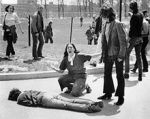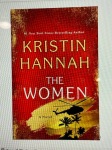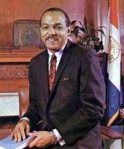In her acknowledgments at the end of The Women, Kristin Hannah said that she originally created towns and evacuation hospitals within Vietnam for fictional latitude but her Vietnam veteran readers felt strongly that she should name the places accurately; so she changed to real names. Logistics, descriptions, and timelines in a few places were altered to support her narrative. It was the naming of real locations and dates that drew me to The Women. But that should be expected because I always assess novels according to how they resonate with my own life, rather than what kind of awards have been won or what critics or anyone else has to say.
 This week I started reading letters from 57 years ago saved from my husband’s home office when he died seven years ago. A letter dated July 4, 1967 was written by Richard Morris the day he arrived at the 1st Cav Division at An Khe, having stayed overnight on the 30th at Travis AFB, leaving shortly after midnight — on to Wake Island, Clark AFB in the Philippines, then arriving at Pleiku the morning of July 3 since they didn’t fly planes at night. A couple of months later Fictitious Frankie also arrived at Pleiku along with Barb. But on that July 4, 1967 date when Richard arrived at An Khe, Fictitious Frankie was still at her original location far south of the Central Highlands, spending more hours during June in the OR working with surgeon Jamie than many married couples spend together in a year. At that same “holiday” Frankie’s mother sent a letter to her which arrived a couple of weeks later: “…The world has gone insane. The hippies aren’t so peaceful … thousands of war protesters, boys burning their
This week I started reading letters from 57 years ago saved from my husband’s home office when he died seven years ago. A letter dated July 4, 1967 was written by Richard Morris the day he arrived at the 1st Cav Division at An Khe, having stayed overnight on the 30th at Travis AFB, leaving shortly after midnight — on to Wake Island, Clark AFB in the Philippines, then arriving at Pleiku the morning of July 3 since they didn’t fly planes at night. A couple of months later Fictitious Frankie also arrived at Pleiku along with Barb. But on that July 4, 1967 date when Richard arrived at An Khe, Fictitious Frankie was still at her original location far south of the Central Highlands, spending more hours during June in the OR working with surgeon Jamie than many married couples spend together in a year. At that same “holiday” Frankie’s mother sent a letter to her which arrived a couple of weeks later: “…The world has gone insane. The hippies aren’t so peaceful … thousands of war protesters, boys burning their

Kent State University Killings of Four Students by the National Guard (1970, not 1967 reference year of this blog post)
draft cards, and women burning their bras. Race riots. Our annual party was a rather diminished affair …all anyone talks about is the war … I heard that she started dropping the acid and left college to join a folk band … living in some commune … she’s a DAR member! People at the club are starting to wonder if the war in Vietnam is wrong” and news of an international war crimes tribunal finding U.S. guilty of bombing civilian targets.
Without creating “spoilers,” I’d like to return to some reader criticisms of “too much romance” or “unrealistic” especially in the latter part of The Women. But I prefer to call these events “twists and turns.” Nothing is more unrealistic than reality itself or fact which looks like fiction because it is too hard to believe. I don’t need to reveal events that happen in the novel because I can draw from my own life for examples of “unrealistic.” I think those who have read the book will understand how my life and Frankie’s intersect in unreality and those who have not yet read it can still enjoy this novel without spoilers thrust upon them by my commentary.
I identified with Fictional Frankie in a number of ways. It appears that, like me, she was born in December of 1945 and so we were both age 21 at the time of the book’s setting. Frankie had whizzed through college and graduated early. I had a plan to complete college in three years instead of four to comply with family expectation that one must finish college before marriage since otherwise you will NOT finish; and I was hurrying through in order to marry my high school sweetheart — until we broke up early in 1966.
A year later, my new soulmate, Richard, said to me, “I feel like all the barriers are just falling away” as we eradicated each perception as to why we might not be right for each other — the first, of course, being that he had to erase his stereotype of Southerners when he learned that I was not the racist he assumed I would be … and discussion about religion, expectations for life, and other important matters. When I said that I could not marry him because I had to finish college first, he retorted, “I can send you to college!”
 I had started freshman year in the summer immediately upon high school graduation. My summer roommate arrived late for dinner on
I had started freshman year in the summer immediately upon high school graduation. My summer roommate arrived late for dinner on
one early August day telling me that she had gone to church to pray. She cried that our country had been attacked (Gulf of Tonkin) and reminded me that her boyfriend was in the Navy on a ship. “We’re going to war,” she said worriedly.
My plan for speedy transit through college lasted only through another summer and the fall of 1965. After my boyfriend and I broke up winter quarter of 1966, I suddenly realized that I had to find a new direction in life; I was moving too fast toward a future that was not going to happen. In looking at my options for slowing down and reassessing where I was going, I applied to two award programs. I stayed out of summer quarter that year to go on a trip awarded to one Ag and one Home Ec major from each Land Grant college. Then I stayed out fall quarter to live in another city with an internship job in my field of study. During fall of 1966 while completing that internship I returned for a weekend visit to my college and hung out with my former roommate at a student coffeehouse on church premises where we helped in the kitchen as we had done in previous visits there. In the hallway between the kitchen and the performance room, we talked with two soldiers from Officer Candidate School at Fort Benning (now Fort Moore); we were within the 50-mile allowed radius from the post. Although Richard was conversing with my roommate and I with his friend, the pairing shifted when someone came by, asking about my trip during summer quarter. When I gave my answer, Richard exclaimed, “Camp Miniwanca! I’ve been to Camp Miniwanca and so has my sister!” That summer week I had been the only person from Alabama at this Michigan camp, but that is what totally changed my life and everything that followed. Truth is stranger than fiction.
Richard’s own story was that he had entered graduate school on a full scholarship in medical sociology but during the first semester had become politically involved, driving for Carl Stokes during his first campaign to become Mayor of Cleveland, Ohio. Charismatic Carl caused Richard to believe that one could make real differences through politics and public service. Richard realized that following his current path of medical sociology would eventually land him in the world of higher education as a professor, and he had realized this was not where he wanted his life to go. Richard knew, of course, that dropping out of grad school would cause him to lose his draft deferment. During that time, serving one’s country was still an expected rite of passage for young men in much of the country and Richard was aware that many contemporary political leaders had military service as part of their backgrounds. And, of course, there was the domino theory threat that the U.S. must stop Communism before it might reach our shores. With current events involving Ukraine, I’m not so sure the domino theory should be discredited, and college campuses are beginning to look like they did before. Richard decided he would face the inevitable on his own terms, so he enlisted in the Army, signed up for Officer Candidate School, and volunteered for Vietnam while some others with the same degree of privilege were making decisions to go to grad school, marry, or call in favors from family connections in order not to be drafted. The draft dictated choices for all young men even if they had ways out, while lack of reproductive options dictated choices for women even if they did not immediately face crisis. Truth is stranger than fiction.Richard was at a stage of life where he was pursuing commitment in relationship. Although I had thought of myself as pursuing new directions instead, apparently relationship commitment was also part of my internal pathway. We met in October, were engaged in December after OCS graduation, and began to discuss marrying before he would leave rather than waiting until after. And so we did marry, in March 1967, five months after we met. (Fictitious Frankie was just arriving in Vietnam.) “Those hasty marriages just don’t last,” but ours lasted fifty years until his death November 2017. Truth is stranger than fiction.
After marrying in March 1967, I was able to accompany Richard to Ft. Polk (Ft. Johnson) which was part of the reason the marriage was before and not after, Vietnam. The first night there, not yet having our trailer park rental, we stayed in his BOQ quarters. Being first to rise, I industriously began tidying the papers strewn over the coffee table. He had already told me that he had previously proposed to a family friend who had refused him because he was joining the Army and she was a pacifist. And now here was her letter saying that she would marry him and that she would even follow him to Vietnam (not as unrealistic as it sounds since she was already a well-traveled adventuresome young woman). Too late! She has always remained our friend. Truth is stranger than fiction.
 As people tried to sway me one direction or the other in deciding whether to marry before or after Vietnam, some asked, “What if he gets killed?” or “What if he is wounded?” The question no one thought to ask was, “What if he is missing for years and years and you do not know whether or not to move on with your life?” After I graduated in December 1967, still somewhat ahead of the timetable of my friends who finished in four years, I lived with my parents, did substitute teaching, went to Hawaii for R&R, and monthly attended a luncheon group called SeaWives (Southeast Asia Wives) in this city with two air force bases, some of the wives receiving support from the rest while awaiting word of missing husbands. My husband did return in a timely fashion so I was with the SeaWives for only a few months with too little time to become close to any of them or to learn their outcomes. If my new husband had died in that war or been among the MIA, obviously the course of my life would not have been the same and I would not now be writing “The Women by Kristin Hannah: Not a review, just an inspiration.” Truth is stranger than fiction.
As people tried to sway me one direction or the other in deciding whether to marry before or after Vietnam, some asked, “What if he gets killed?” or “What if he is wounded?” The question no one thought to ask was, “What if he is missing for years and years and you do not know whether or not to move on with your life?” After I graduated in December 1967, still somewhat ahead of the timetable of my friends who finished in four years, I lived with my parents, did substitute teaching, went to Hawaii for R&R, and monthly attended a luncheon group called SeaWives (Southeast Asia Wives) in this city with two air force bases, some of the wives receiving support from the rest while awaiting word of missing husbands. My husband did return in a timely fashion so I was with the SeaWives for only a few months with too little time to become close to any of them or to learn their outcomes. If my new husband had died in that war or been among the MIA, obviously the course of my life would not have been the same and I would not now be writing “The Women by Kristin Hannah: Not a review, just an inspiration.” Truth is stranger than fiction.
 Already retired in 2009, we decided to attend the First Cavalry Division reunion at Ft. Hood (now Ft. Cavazos), and Richard was given an opportunity to sing the songs he wrote in Vietnam. He had never previously participated in any reunions nor stayed in touch with anyone he had served with in Vietnam. He was, however, eager to reconnect with the sergeants who had taught him so much and with some of the other officers. Forty-two years after our Vietnam first year of
Already retired in 2009, we decided to attend the First Cavalry Division reunion at Ft. Hood (now Ft. Cavazos), and Richard was given an opportunity to sing the songs he wrote in Vietnam. He had never previously participated in any reunions nor stayed in touch with anyone he had served with in Vietnam. He was, however, eager to reconnect with the sergeants who had taught him so much and with some of the other officers. Forty-two years after our Vietnam first year of marriage, my own mind had fact and fiction so jumbled that I had trouble remembering which stories belonged to the real people Richard served with and which stories belonged to the fictitious stand-ins in Richard’s Cologne No. 10 for Men novel who had been created in the author’s imagination.
marriage, my own mind had fact and fiction so jumbled that I had trouble remembering which stories belonged to the real people Richard served with and which stories belonged to the fictitious stand-ins in Richard’s Cologne No. 10 for Men novel who had been created in the author’s imagination.
Additionally, Richard met at this reunion the lieutenant he had replaced in Vietnam whose legs had been blown off. By this time, with neuropathy affecting Richard’s gait after his spine broke in 2004 when he was diagnosed with multiple myeloma at age 61 (one of the cancers presumed to have been caused by Agent Orange for anyone who had served in-country), Richard exclaimed, “He walks better than I do!” Truth is stranger than fiction.
 In conversation with a veteran friend who informed Richard of findings of Agent Orange’s presumed connection to certain cancers, Richard answered, “I don’t remember being exposed to Agent Orange,” and his friend asked, “Don’t you remember those bare hills at Khe Sahn?”
In conversation with a veteran friend who informed Richard of findings of Agent Orange’s presumed connection to certain cancers, Richard answered, “I don’t remember being exposed to Agent Orange,” and his friend asked, “Don’t you remember those bare hills at Khe Sahn?”
It took more years before Naval military personnel qualified for benefits for Agent Orange exposure because they had not been “in-country” even if they may have been transporting the chemical.
Kristin Hannah’s storyline represented most of the “issues” emerging from the Vietnam war, even those which may not have reached full impact until many years after the novel The Women ends. Some issues were omitted, like Operation Babylift, the “Boat People” we and others sponsored, and others which escape me at the moment. Truth is stranger than fiction.
Although detractors for The Women are far fewer than those who praise the novel, some of them suggest that Hannah should have dropped the second part of the novel and instead expanded the stories of the other women in the first part. It seems they want no part of a Vietnam war book that does not remain within the action confines of the war years; but with such lack of interest for the war’s aftermath, they refuse to acknowledge the greater impact of Vietnam’s effect on our country, its social mores, its political decisions, and the continuing divide.
Part 6 – Send, scents, and senses — “The Women by Kristin Hannah – Not a review, simply an inspiration” – is my upcoming post.
Any posts appearing on this website after author and singer-songwriter Richard Morris’s death in November of 2017 were written and posted by his wife, Barbara Morris.













